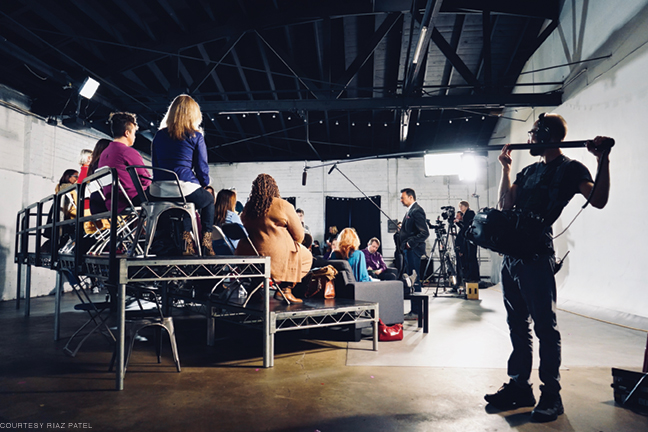
A “triple minority” television producer just wants people to listen to each other.
Riaz Patel C’95 is a specialist in uncomfortable conversations. He’s had no other choice his whole life.
Patel’s family came to the United States from Pakistan when he was young, and he grew up in rural Maryland and West Virginia. As an elementary schooler during the Iran Hostage Crisis, he remembers being “pushed into the freezer where they kept the milk” by older students. “And they said, ‘Why is your family holding Americans hostage?’” He recalls answering, “I’m not even from Iran. You’ve got the wrong country! I’m from Pakistan.”
Those kind of dangerous assumptions flared whenever there was a conflict in the Middle East, says Patel, who bills himself as a “triple minority” because he’s Muslim, an immigrant, and gay. He generally tried to combat them the best way he knew how: with honesty and openness. “It’s been a theme of my life,” he notes, “to use conversation to humanize myself and to find connection.”
Drawn to Penn because the student body offered the kind of diversity that had been absent from his early life, Patel studied psychology, learning research skills and the fundamentals of human behavior. After Penn, he moved to Los Angeles, where he produced reality television shows such as How to Look Good Naked, How Do I Look?, and Family S.O.S with Jo Frost, earning two Daytime Emmy nominations.
But in the fall of 2016, as frustration built during the lead-up to the presidential election, the TV producer decided to try to expand his horizons. The week before Donald Trump W’68 was elected president, Patel flew to Ketchikan, Alaska, on a whim with his husband and infant daughter. “Nowhere in my real world did I know anyone who was voting for Trump or felt differently [than me],” he says. “And nowhere in my algorithmically curated screen world were any opposing opinions reasonably being presented to me.”
Yet, clearly, there were millions of people whose thinking diverged from his. So he spent a week in rural Alaska, talking to as many as he could find. To the fisherman who sat next to him in a diner. To the waitress. To a shipbuilder. To a local state legislator.
Those conversations, though uncomfortable at times, proved valuable as Patel began his second act: developing a systematized approach to bridging societal divides. His first attempt was in partnership with conservative political commentator Glenn Beck, bringing together NRA members, conservatives, liberals, and gun control activists. He produced a podcast called “The Gun Debate: A Human-to-Human Approach,” chronicling their first discussion.
Patel then branched out into facilitating exchanges about other contentious issues, recruiting participants via social media, and renting out conference rooms in cities across the country (some of the stops have included Dallas; New York; Baltimore; Washington, DC; St. Louis; Los Angeles; Tampa, Florida; Arlington, Virginia; and Ogden, Utah). After watching for when and where “conversations went off the rails and why,” he developed a method of facilitating discourse between people who start out believing they are diametrically opposed. He calls it the EPIC (Equalization, Personification, Information Gathering, and Collaboration) system.
Often people looking to step across a divide will approach him, having heard about these conversations. “Actually getting them to show up is the real challenge,” says Patel, who meets with each participant in advance. “People have to say, ‘Not only am I willing to come, I’m willing to commit the time and energy.’ Until we get to an understanding, no one gets up. No one leaves.”
The first phase—Equalization—is when participants figure out what they have in common. For example, regarding guns, Patel says many had a shared feeling of dread about dropping their kids off at school. The next two phases—Personification and Information Gathering—go hand in hand, as each person talks about the experiences that are fundamental to their belief systems. “One person is personalizing their beliefs while the others are information gathering,” Patel says. “They’re asking questions to understand.”
Patel stresses that people cannot bring in their sources, only personal experiences that have shaped them. “CNN and Fox have nothing to do with the people in that room,” he says.
Once there is trust, the group moves to the final phase. “The Collaboration for answers comes only after you have some connection with each other,” Patel says. “It could go off the rails. But it won’t because you have a bond, you have a shared history.” In this phase, the group looks for ways to combine strategies to help solve shared problems. “Collaboration does not necessarily mean agreement,” he says. “But it does mean actually hearing the other side and understanding all the options on the table.” It means shifting your perspective just enough to see merit in a variety of solutions.
Patel is now exploring other applications for the EPIC system, which he believes has helped people learn—or relearn—the skill of listening and empathizing. He recently taped a show based on one of these conversations, with an audience of strangers opening up to the group. “Strangers helping strangers can be a very powerful thing,” Patel says.
Patel believes the EPIC system is scalable. He is working on ways to train other facilitators, find sponsors, publish his findings, and create more sharable videos. He says he’s also recently started working with social psychologist and New York University professor Jonathan Haidt G’91 Gr’92 to co-teach training sessions about this kind of communication.
“I’m trying to get people to learn how to converse again and to have conversation that yields true connection,” Patel says. “That’s how you don’t feel isolated and alone.”
—Emily Rosenbaum C’95 GEd’96

